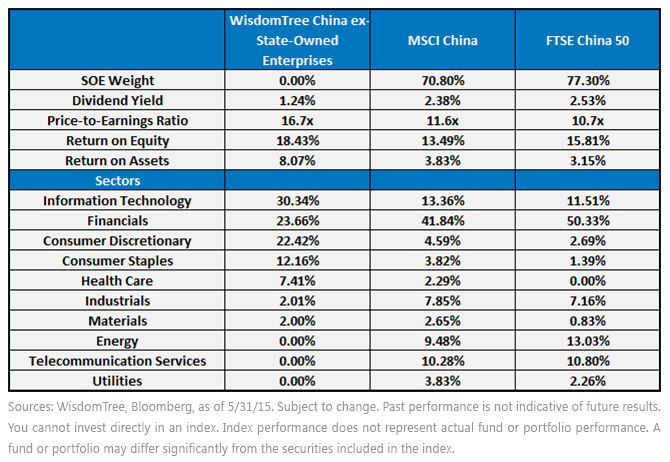Introducing WisdomTree China ex State Owned Enterprises Index


 For definitions of terms and indexes in the chart, please visit our glossary.
• Valuations Tell a Mixed Story: Looking at dividend yield and price-to-earnings (P/E) ratios of the various Chinese indexes above would lead an investor to believe that the non-state-owned part of the market is priced higher. But if considering profitability metrics like return on equity and return on assets, an investor could conclude that non-SOEs are more reasonably priced. WisdomTree believes that SOEs generally trade at lower valuations due to the perceived risk of government involvement; the most difficult part is determining the right level of discount warranted.
• Information Technology and Consumer Sectors Rise to the Top: Given the Chinese government’s low amount of involvement in the Information Technology sector and Consumer sectors (Discretionary and Staples), we are not surprised that these sectors become some of the largest weight after the state-owned enterprises have been removed. WisdomTree believes these sectors will continue to be important to focus on in the future as China’s standard of living increases and its large population base transforms into consumers.
• Under-Weight Financial Sector: Given the Chinese government’s high amount of involvement within the Financials sector, specifically within the country’s large banks, it is reasonable to expect this sector to make up a lower percentage after state-owned enterprises have been removed. WisdomTree believes that although state-owned Chinese banks are among the lowest-priced areas of the global markets, they remain the largest risk in owning China based solely on market cap.
As China continues to grow and transform, investors will demand more ways to gain access to this unique country. Recently, some investors have expressed concern over state-owned enterprises, and they have sought tools to limit their exposure, even after understanding the valuation differences. These investors are interested in concentrating their exposure on the private sector and accessing higher profitability potential. Although it is impossible to know which area will be more beneficial to focus on going forward, we think it is important to have different tools available, and the case for either exposure could be made, depending on an investor’s goals and objectives.
1Lingling Wei and Brian Spegele, “China Considering Mergers among Its Biggest State Oil Companies,” The Wall Street Journal, 2/17/15.
For definitions of terms and indexes in the chart, please visit our glossary.
• Valuations Tell a Mixed Story: Looking at dividend yield and price-to-earnings (P/E) ratios of the various Chinese indexes above would lead an investor to believe that the non-state-owned part of the market is priced higher. But if considering profitability metrics like return on equity and return on assets, an investor could conclude that non-SOEs are more reasonably priced. WisdomTree believes that SOEs generally trade at lower valuations due to the perceived risk of government involvement; the most difficult part is determining the right level of discount warranted.
• Information Technology and Consumer Sectors Rise to the Top: Given the Chinese government’s low amount of involvement in the Information Technology sector and Consumer sectors (Discretionary and Staples), we are not surprised that these sectors become some of the largest weight after the state-owned enterprises have been removed. WisdomTree believes these sectors will continue to be important to focus on in the future as China’s standard of living increases and its large population base transforms into consumers.
• Under-Weight Financial Sector: Given the Chinese government’s high amount of involvement within the Financials sector, specifically within the country’s large banks, it is reasonable to expect this sector to make up a lower percentage after state-owned enterprises have been removed. WisdomTree believes that although state-owned Chinese banks are among the lowest-priced areas of the global markets, they remain the largest risk in owning China based solely on market cap.
As China continues to grow and transform, investors will demand more ways to gain access to this unique country. Recently, some investors have expressed concern over state-owned enterprises, and they have sought tools to limit their exposure, even after understanding the valuation differences. These investors are interested in concentrating their exposure on the private sector and accessing higher profitability potential. Although it is impossible to know which area will be more beneficial to focus on going forward, we think it is important to have different tools available, and the case for either exposure could be made, depending on an investor’s goals and objectives.
1Lingling Wei and Brian Spegele, “China Considering Mergers among Its Biggest State Oil Companies,” The Wall Street Journal, 2/17/15. Important Risks Related to this Article
Investments in emerging, offshore or frontier markets are generally less liquid and less efficient than investments in developed markets and are subject to additional risks, such as risks of adverse governmental regulation and intervention or political developments. Investments focused in China increase the impact of events and developments associated with the region, which can adversely affect performance.


